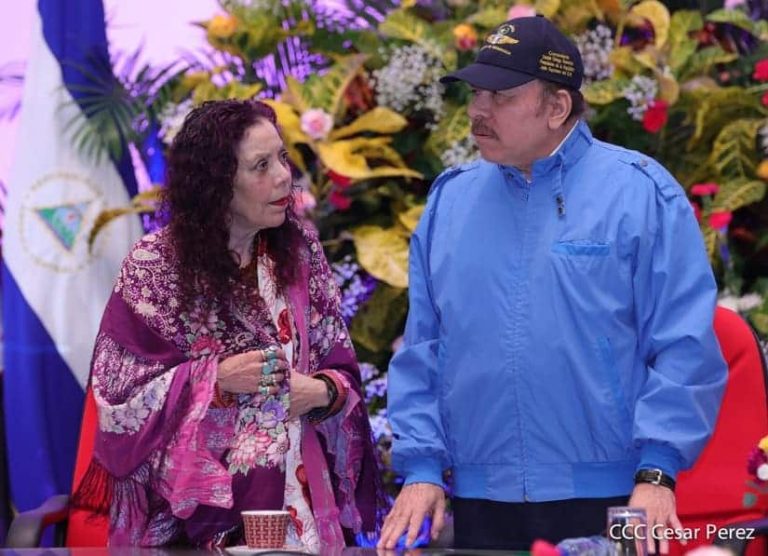7 de octubre 2022

Children of Exile: The Births “Sowing Hope” in the Camp of Nicaraguan Farmers

PUBLICIDAD 1M
PUBLICIDAD 4D
PUBLICIDAD 5D
A Buenos Aires federal prosecutor filed a criminal complaint against the authorities of Daniel Ortega’s regime

Photo: Taken from El 19 Digital
In the courts of Comodoro Py, Buenos Aires, Argentina, on Tuesday, October 5, a criminal investigation began against dictator Daniel Ortega and the high authorities of his regime to determine whether they committed crimes against humanity in Nicaragua. Something that the Argentinian justice system bases on the principle of universal jurisdiction recognized in its Constitution.
A publication of the Argentinian media outlet Infobae states that the case began with a complaint filed by lawyers Dario Richarte and Diego Pirota against the Nicaraguan head of state, his wife and Vice President Rosario Murillo, and all those officials who are part of the repressive apparatus that persecuted political opponents since April 2018.
Therefore, federal judge Ariel Lijo ordered the sending of a request to the Nicaraguan justice system to learn if there are any open cases where extrajudicial executions, illegal detentions, forced disappearance of people, or torture are being investigated.
In promoting the investigation, prosecutor Eduardo Taiano explained that the Argentine federal justice system is authorized to investigate crimes based on article 118 of the Constitution. This article recognizes the principle of universal jurisdiction, and the international commitment assumed by the country that “establish the duty of the domestic courts to investigate on behalf of the international community regardless of the place where they have occurred (according to paragraph six of the preamble of the Rome Statute of the International Criminal Court).”
Taiano also stressed that the International Criminal Court could not try possible crimes against humanity in Nicaragua because that country did not ratify the Rome Statute.
According to Infobae, the Argentine federal courts have previously investigated other allegations of crimes against humanity that occurred in other countries, such as the persecution of practitioners of the “Falun Gong” discipline in China, the crimes of the Franco regime in Spain, and the genocide denounced by the Rohingya people in Myanmar.
Among those accused of committing crimes against humanity are the Chief of the National Police, Francisco Diaz; presidential advisor, Nestor Moncada Lau; Nicaraguan Army Chief, General Julio Cesar Aviles; Minister of Transportation, retired General Oscar Mojica and President of the National Assembly, deputy Gustavo Porras.
Other accused persons are the Director of the Nicaraguan Social Security Institute, Roberto Lopez; the presidential advisor on defense and security matters, Oscar Valladares; the former Minister of Health, Sonia Castro; and the president of Nicaragua’s Central Bank, Ovidio Reyes Ramirez.
In the complaint filed the social and political context experienced in Nicaragua since 2018 is described. And it is done based on a series of reports and investigations carried out by the Inter-American Commission on Human Rights, the (UN) Human Rights Council, Amnesty International, the Center for Legal and Social Studies (CELS), the International Federation for Human Rights (FIDH), the Nicaraguan Center for Human Rights (CENIDH), and the Interdisciplinary Group of Independent Experts for Nicaragua.
Those reports indicate a series of stages in the repressive strategy of the Ortega regime, which has left at least 355 murdered in that country, a thousand political prisoners and more than 100,000 Nicaraguans in exile.
According to the judicial complaint, to which Infobae had access, among the characteristic elements of the current repression in Nicaragua “stands out the arrest of a new group of people identified as opponents of the Government,” among them seven presidential hopefuls, political activists, public figures in the country’s political life, former workers of civil society organizations, student leaders, peasant representatives and journalists.
The complaint filed by lawyers Richarte and Pirota also highlights the repeated attacks against members of the Catholic Church, especially against the bishop of the dioceses of Matagalpa, Monsignor Rolando Alvarez, who has been under house arrest since August 19.
The judicial complaint filed in Buenos Aires requests, among other things, that the highest officials of Daniel Ortega’s regime be summoned for questioning and that the victims of the repression and their relatives also be able to testify as witnesses.
As a first measure, judge Lijo ordered to send a request to the Nicaraguan justice system and asked the Argentine Foreign Ministry to “interpose the necessary means to request the Inter-American Commission on Human Rights to inform whether proceedings have been initiated in relation to the facts mentioned herein,” reported the Argentinian media outlet.
This article was originally published in Spanish in Confidencial and translated by Havana Times.
PUBLICIDAD 3M
Confidencial es un diario digital nicaragüense, de formato multimedia, fundado por Carlos F. Chamorro en junio de 1996. Inició como un semanario impreso y hoy es un medio de referencia regional con información, análisis, entrevistas, perfiles, reportajes e investigaciones sobre Nicaragua, informando desde el exilio por la persecución política de la dictadura de Daniel Ortega y Rosario Murillo.
PUBLICIDAD 3D